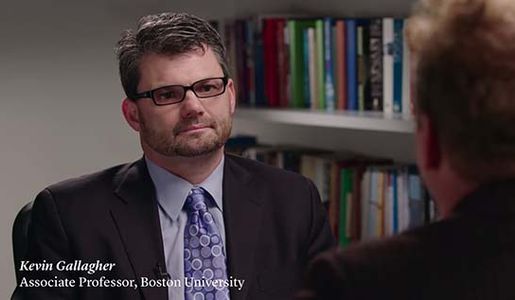VIDEO: Gallagher on Economic Thinking
Kevin Gallagher, associate professor of Global Development Policy at the Frederick S. Pardee School of Global Studies at Boston University, was interviewed by the Institute for New Economic Thinking on his new book, Ruling Capital: Emerging Markets and the Reregulation of Cross Border Finance.
From the text of the interview article:
As Gallagher (an Institute grantee) points out in the book and in the interview below, the 2008 global financial crisis has opened a new chapter in the debate over the proper policy responses to pro-cyclical capital flows. Until very recently certain strands of the economics profession as well as industrialized country national governments and international financial institutions have remained either hostile or silent to regulating capital movements. But there is no longer policy unanimity on this issue, which is in marked contrast to the period during the Asian Financial Crisis, where the so-called “Washington Consensus” dominated policy making in both the developed and developing world, and capital account liberalization remained paramount.
The interview is conducted by Marshall Auerback. You can watch the video here.
Gallagher is an associate professor of global development policy at Boston University’s Frederick S. Pardee School of Global Studies, where he co-directs the Global Economic Governance Initiative and the Global Development Policy Program.
He is the co-chair of the Task Force on Regulating Capital Flows and has served as an advisor to the Department of State and the Environmental Protection Agency in the United States. as well as to the United Nations Conference on Trade and Development. Gallagher has been a visiting or adjunct professor at the Fletcher School of Law and Diplomacy; El Colegio de Mexico in Mexico; Tsinghua University in China, and the Center for State and Society in Argentina.
Gallagher is co-editor of the Review of International Political Economy and writes regular columns in the Financial Times and the Guardian.
